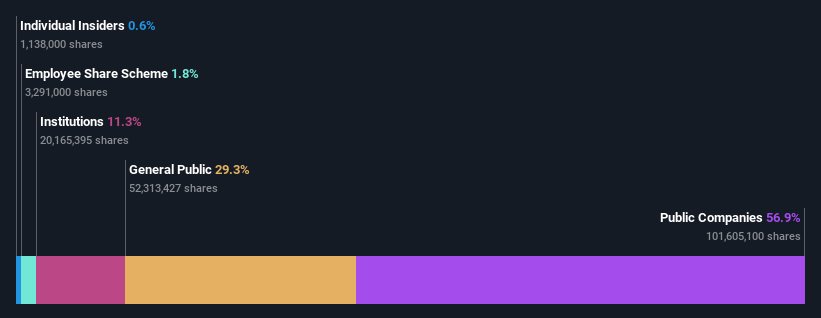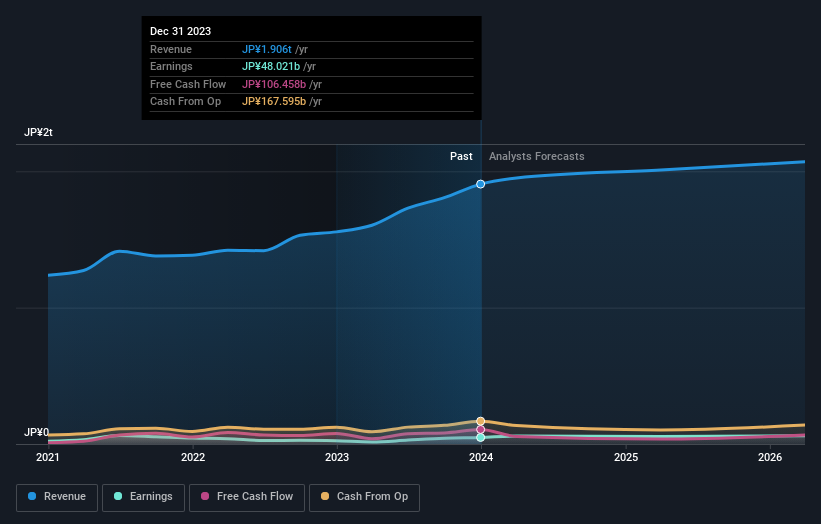Stock Analysis
- Japan
- /
- Auto Components
- /
- TSE:3116
Toyota Boshoku Corporation's (TSE:3116) last week's 4.4% decline must have disappointed public companies who have a significant stake

Key Insights
- Significant control over Toyota Boshoku by public companies implies that the general public has more power to influence management and governance-related decisions
- 51% of the business is held by the top 3 shareholders
- Institutional ownership in Toyota Boshoku is 11%
To get a sense of who is truly in control of Toyota Boshoku Corporation (TSE:3116), it is important to understand the ownership structure of the business. And the group that holds the biggest piece of the pie are public companies with 57% ownership. In other words, the group stands to gain the most (or lose the most) from their investment into the company.
And last week, public companies endured the biggest losses as the stock fell by 4.4%.
Let's delve deeper into each type of owner of Toyota Boshoku, beginning with the chart below.
See our latest analysis for Toyota Boshoku

What Does The Institutional Ownership Tell Us About Toyota Boshoku?
Many institutions measure their performance against an index that approximates the local market. So they usually pay more attention to companies that are included in major indices.
Toyota Boshoku already has institutions on the share registry. Indeed, they own a respectable stake in the company. This can indicate that the company has a certain degree of credibility in the investment community. However, it is best to be wary of relying on the supposed validation that comes with institutional investors. They too, get it wrong sometimes. When multiple institutions own a stock, there's always a risk that they are in a 'crowded trade'. When such a trade goes wrong, multiple parties may compete to sell stock fast. This risk is higher in a company without a history of growth. You can see Toyota Boshoku's historic earnings and revenue below, but keep in mind there's always more to the story.

Toyota Boshoku is not owned by hedge funds. Toyota Motor Corporation is currently the largest shareholder, with 43% of shares outstanding. For context, the second largest shareholder holds about 4.3% of the shares outstanding, followed by an ownership of 4.0% by the third-largest shareholder.
A more detailed study of the shareholder registry showed us that 3 of the top shareholders have a considerable amount of ownership in the company, via their 51% stake.
Researching institutional ownership is a good way to gauge and filter a stock's expected performance. The same can be achieved by studying analyst sentiments. There are a reasonable number of analysts covering the stock, so it might be useful to find out their aggregate view on the future.
Insider Ownership Of Toyota Boshoku
The definition of company insiders can be subjective and does vary between jurisdictions. Our data reflects individual insiders, capturing board members at the very least. The company management answer to the board and the latter should represent the interests of shareholders. Notably, sometimes top-level managers are on the board themselves.
Most consider insider ownership a positive because it can indicate the board is well aligned with other shareholders. However, on some occasions too much power is concentrated within this group.
Our most recent data indicates that insiders own less than 1% of Toyota Boshoku Corporation. Keep in mind that it's a big company, and the insiders own JP¥2.8b worth of shares. The absolute value might be more important than the proportional share. Arguably, recent buying and selling is just as important to consider. You can click here to see if insiders have been buying or selling.
General Public Ownership
With a 29% ownership, the general public, mostly comprising of individual investors, have some degree of sway over Toyota Boshoku. This size of ownership, while considerable, may not be enough to change company policy if the decision is not in sync with other large shareholders.
Public Company Ownership
We can see that public companies hold 57% of the Toyota Boshoku shares on issue. This may be a strategic interest and the two companies may have related business interests. It could be that they have de-merged. This holding is probably worth investigating further.
Next Steps:
It's always worth thinking about the different groups who own shares in a company. But to understand Toyota Boshoku better, we need to consider many other factors. For example, we've discovered 1 warning sign for Toyota Boshoku that you should be aware of before investing here.
If you are like me, you may want to think about whether this company will grow or shrink. Luckily, you can check this free report showing analyst forecasts for its future.
NB: Figures in this article are calculated using data from the last twelve months, which refer to the 12-month period ending on the last date of the month the financial statement is dated. This may not be consistent with full year annual report figures.
Valuation is complex, but we're helping make it simple.
Find out whether Toyota Boshoku is potentially over or undervalued by checking out our comprehensive analysis, which includes fair value estimates, risks and warnings, dividends, insider transactions and financial health.
View the Free AnalysisHave feedback on this article? Concerned about the content? Get in touch with us directly. Alternatively, email editorial-team (at) simplywallst.com.
This article by Simply Wall St is general in nature. We provide commentary based on historical data and analyst forecasts only using an unbiased methodology and our articles are not intended to be financial advice. It does not constitute a recommendation to buy or sell any stock, and does not take account of your objectives, or your financial situation. We aim to bring you long-term focused analysis driven by fundamental data. Note that our analysis may not factor in the latest price-sensitive company announcements or qualitative material. Simply Wall St has no position in any stocks mentioned.
About TSE:3116
Toyota Boshoku
Toyota Boshoku Corporation develops, manufactures, and sells automotive interior systems in Japan, the United States, China, and internationally.
Flawless balance sheet, undervalued and pays a dividend.

